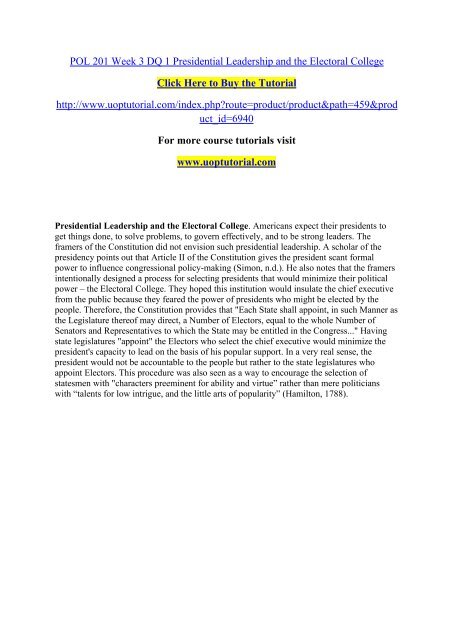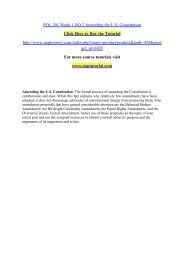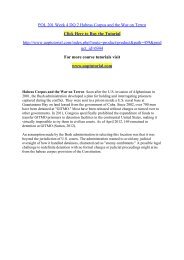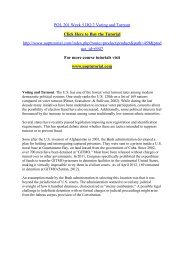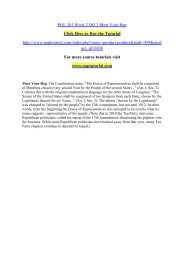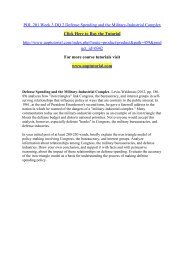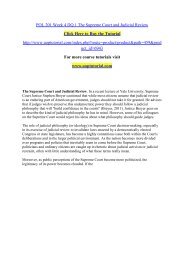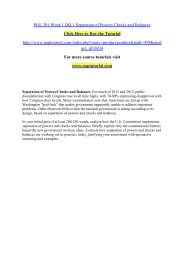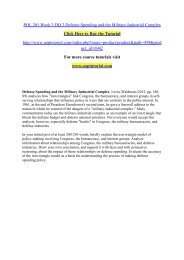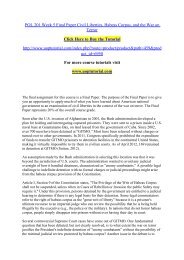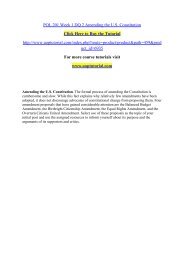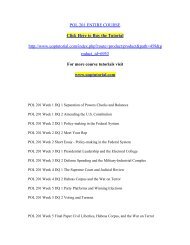POL 201 Week 3 DQ 1 Presidential Leadership and the Electoral College/ Uoptutorial
For more course tutorials visit www.uoptutorial.com Presidential Leadership and the Electoral College. Americans expect their presidents to get things done, to solve problems, to govern effectively, and to be strong leaders. The framers of the Constitution did not envision such presidential leadership. A scholar of the presidency points out that Article II of the Constitution gives the president scant formal power to influence congressional policy-making (Simon, n.d.). He also notes that the framers intentionally designed a process for selecting presidents that would minimize their political power – the Electoral College. They hoped this institution would insulate the chief executive from the public because they feared the power of presidents who might be elected by the people. Therefore, the Constitution provides that "Each State shall appoint, in such Manner as the Legislature thereof may direct, a Number of Electors, equal to the whole Number of Senators and Representatives to which the State may be entitled in the Congress..." Having state legislatures "appoint" the Electors who select the chief executive would minimize the president's capacity to lead on the basis of his popular support. In a very real sense, the president would not be accountable to the people but rather to the state legislatures who appoint Electors. This procedure was also seen as a way to encourage the selection of statesmen with "characters preeminent for ability and virtue” rather than mere politicians with “talents for low intrigue, and the little arts of popularity” (Hamilton, 1788).
For more course tutorials visit
www.uoptutorial.com
Presidential Leadership and the Electoral College. Americans expect their presidents to get things done, to solve problems, to govern effectively, and to be strong leaders. The framers of the Constitution did not envision such presidential leadership. A scholar of the presidency points out that Article II of the Constitution gives the president scant formal power to influence congressional policy-making (Simon, n.d.). He also notes that the framers intentionally designed a process for selecting presidents that would minimize their political power – the Electoral College. They hoped this institution would insulate the chief executive from the public because they feared the power of presidents who might be elected by the people. Therefore, the Constitution provides that "Each State shall appoint, in such Manner as the Legislature thereof may direct, a Number of Electors, equal to the whole Number of Senators and Representatives to which the State may be entitled in the Congress..." Having state legislatures "appoint" the Electors who select the chief executive would minimize the president's capacity to lead on the basis of his popular support. In a very real sense, the president would not be accountable to the people but rather to the state legislatures who appoint Electors. This procedure was also seen as a way to encourage the selection of statesmen with "characters preeminent for ability and virtue” rather than mere politicians with “talents for low intrigue, and the little arts of popularity” (Hamilton, 1788).
Create successful ePaper yourself
Turn your PDF publications into a flip-book with our unique Google optimized e-Paper software.
<strong>POL</strong> <strong>201</strong> <strong>Week</strong> 3 <strong>DQ</strong> 1 <strong>Presidential</strong> <strong>Leadership</strong> <strong>and</strong> <strong>the</strong> <strong>Electoral</strong> <strong>College</strong>Click Here to Buy <strong>the</strong> Tutorialhttp://www.uoptutorial.com/index.php?route=product/product&path=459&product_id=6940For more course tutorials visitwww.uoptutorial.com<strong>Presidential</strong> <strong>Leadership</strong> <strong>and</strong> <strong>the</strong> <strong>Electoral</strong> <strong>College</strong>. Americans expect <strong>the</strong>ir presidents toget things done, to solve problems, to govern effectively, <strong>and</strong> to be strong leaders. Theframers of <strong>the</strong> Constitution did not envision such presidential leadership. A scholar of <strong>the</strong>presidency points out that Article II of <strong>the</strong> Constitution gives <strong>the</strong> president scant formalpower to influence congressional policy-making (Simon, n.d.). He also notes that <strong>the</strong> framersintentionally designed a process for selecting presidents that would minimize <strong>the</strong>ir politicalpower – <strong>the</strong> <strong>Electoral</strong> <strong>College</strong>. They hoped this institution would insulate <strong>the</strong> chief executivefrom <strong>the</strong> public because <strong>the</strong>y feared <strong>the</strong> power of presidents who might be elected by <strong>the</strong>people. Therefore, <strong>the</strong> Constitution provides that "Each State shall appoint, in such Manner as<strong>the</strong> Legislature <strong>the</strong>reof may direct, a Number of Electors, equal to <strong>the</strong> whole Number ofSenators <strong>and</strong> Representatives to which <strong>the</strong> State may be entitled in <strong>the</strong> Congress..." Havingstate legislatures "appoint" <strong>the</strong> Electors who select <strong>the</strong> chief executive would minimize <strong>the</strong>president's capacity to lead on <strong>the</strong> basis of his popular support. In a very real sense, <strong>the</strong>president would not be accountable to <strong>the</strong> people but ra<strong>the</strong>r to <strong>the</strong> state legislatures whoappoint Electors. This procedure was also seen as a way to encourage <strong>the</strong> selection ofstatesmen with "characters preeminent for ability <strong>and</strong> virtue” ra<strong>the</strong>r than mere politicianswith “talents for low intrigue, <strong>and</strong> <strong>the</strong> little arts of popularity” (Hamilton, 1788).


